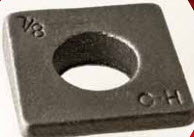
Beveled washers offer an effective load-distribution solution for uneven parts. When using a threaded fastener to connect two or more parts, you may need to use a washer as well. As the head of the threaded fastener presses against the adjacent part, it will create focused tension. This tension may cause the adjacent part to crack or otherwise break. A washer will distribute the fastener’s load across a larger surface area so that the adjacent part is better protected from damage.
Assuming the parts you want to fasten are parallel, you can use a traditional washer. If the parts are uneven, however, you’ll need to use a different solution, such as a beveled washer. Beveled washers are angled, which allows them to accommodate uneven parts. What should you consider when choosing beveled washers exactly?
#1) Material
Beveled washers are available in different materials. Some of them are made of carbon steel or stainless steel. Other beveled washers are made of hot-dipped galvanized (HDG) steel. HDG steel is characterized by the presence of a protective coating. It features an outer layer of zinc that protects the underlying steel from oxidation. There are also iron beveled washers. Iron beveled washers are typically more malleable (see below) than steel beveled washers.
#2) Size
You should consider the size when choosing beveled washers. Like with traditional washers, beveled washers must fit the fasteners with which they are used. If a beveled washer is too small, the fastener won’t fit through the center of it. If a beveled washer is too big, it may stop the fastener’s head from pressing into the adjacent part.
#3) Shape
Not all beveled washers are the same shape. Some beveled washers are round, whereas others are square. Regardless of the shape, all beveled washers are angled. This angled design allows them to distribute the load of fasteners with uneven parts. With that said, square beveled washers typically offer more uniformity when used with square-shaped parts.
#4) Hardened vs Malleable
There are hardened beveled washers, and there are malleable beveled washers. The former offers a superior level of resistance to deformity. When hardened, beveled washers can resist greater loads without becoming deformed. But there are still reasons to consider malleable beveled washers. If you’re planning to use them on delicate parts, for instance, you may want to choose malleable beveled washers. They are softer than their hardened counterparts, making them a better choice for delicate parts.
#5) Price
Don’t forget to consider the price when choosing beveled washers. Prices vary depending on many factors, such as the material, finish, shape and size. The unit count may also affect the price. You can often save money by purchasing beveled washers in bulk rather than individually.
